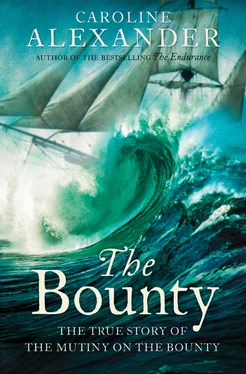‘If there is any punishment that ought to be inflicted on a set of Men for neglect I am sure it ought on the Admiralty,’ he wrote irascibly on 10 December 1787, ‘for my three weeks detention at this place during a fine fair wind which carried all outward bound ships dear of the channel but me, who wanted it most.’
Nearly two weeks later, he had retreated back to Spithead, still riding out bad weather.
‘It is impossible to say what may be the result,’ Bligh wrote to Campbell, his anxiety mounting. ‘I shall endeavor to get round [the Horn]; but with heavy Gales, should it be accompanied with sleet & snow my people will not be able to stand it…Indeed I feel my voyage a very arduous one, and have only to hope in return that whatever the event may be my poor little Family may be provided for. I have this comfort,’ he continued with some complacency, ‘that my health is good and I know of nothing that can scarce happen but I have some resource for – My little Ship is in the best of order and my Men & officers all good & feel happy under my directions.’
At last, on 23 December 1787, the Bounty departed England and after a rough passage arrived at Santa Cruz, in Tenerife. Here, fresh provisions were acquired and repairs made, for the ship had been mauled by severe storms.
‘The first sea that struck us carryed away all my spare yards and some spars,’ Bligh reported, writing again to Campbell; ‘– the second broke the Boats chocks & stove them & I was buryed in the Sea with my poor little crew…’
Despite the exasperating delay of his departure, the tumultuous passage and the untold miles that still lay ahead, Bligh’s spirits were now high – manifestly higher than when he had first set out. On 17 February 1788, off Tenerife, he took advantage of a passing British whaler, the Queen of London , to drop a line to Sir Joseph Banks, his patron and the man most responsible for the breadfruit venture.
‘I am happy and satisfyed in my little Ship and we are now fit to go round half a score of worlds,’ Bligh wrote, ‘both Men & Officers tractable and well disposed & cheerfulness & content in the countenance of every one. I am sure nothing is even more conducive to health. – I have no cause to inflict punishments for I have no offenders and every thing turns out to my most sanguine expectations.’
‘My Officers and Young Gentlemen are all tractable and well disposed,’ he continued in the same vein to Campbell, ‘and we now understand each other so well that we shall remain so the whole voyage…’
Bligh fully expected these to be his last communications on the outward voyage. But monstrous weather off Cape Horn surpassed even his worst expectations. After battling contrary storms and gales for a full month, he conceded defeat and reversed his course for the Cape of Good Hope. He would approach Tahiti by way of the Indian Ocean and Van Diemen’s Land (now Tasmania), a detour that would add well over ten thousand miles to his original voyage.
‘I arrived here yesterday,’ he wrote to Campbell on 25 May from the southernmost tip of Africa, ‘after experiencing the worst of weather off Cape Horn for 30 Days…I thought I had seen the worst of every thing that could be met with at Sea, yet I have never seen such violent winds or such mountainous Seas.’ A Dutch ship, he could not resist adding, had also arrived at the Cape with thirty men having died on board and many more gravely ill; Bligh had brought his entire company through, safe and sound.
The Bounty passed a month at the Cape recovering, and was ready to sail at the end of June. A still arduous journey lay ahead but Bligh’s confidence was now much greater than when he had embarked; indeed, in this respect he had shown himself to be the ideal commander, one whose courage, spirits and enthusiasm were rallied, not daunted, by difficulties and delays. Along with his ship and men, he had weathered the worst travails he could reasonably expect to face.
The long-anticipated silence followed; but when over a year later it was suddenly broken, Bligh’s correspondence came not from the Cape, nor any other port of call on the expected route home, but from Coupang (Kupang) in the Dutch East Indies. The news he reported in letters to Duncan Campbell, to Joseph Banks and above all to his wife, Elizabeth, was so wholly unexpected, so unconnected to the stream of determined and complacent letters of the year before as to be almost incomprehensible.
‘My Dear Dear Betsy,’ Bligh wrote with palpable exhaustion to his wife on 19 August 1789, ‘I am now in a part of the world that I never expected, it is however a place that has afforded me relief and saved my life…
‘Know then my own Dear Betsy, I have lost the Bounty… ’
Tahiti, 1791
At daylight on a fine, fair, breezy day in March, a young man in his late teens said goodbye to his wife and stepped out of his neat cottage picturesquely set amid citrus trees at the foot of a hill for an excursion to the mountains. Darkly tanned and heavily tattooed with the traditional patterns of manhood across his backside, the youth could have passed for one of the Tahitians who met him outside. Peter Heywood, however, was an Englishman, not an ‘Indian’, and close observation would have revealed that one of the tattoos inked on his leg was not native, but the symbol of the Isle of Man. Young Heywood had been living here, in his idyllic garden home just beyond Matavai Bay, since September 1789, when the Bounty , under the command of Master’s Mate Fletcher Christian, had deposited him and fifteen other shipmates at Tahiti – and then vanished in the night, never to be seen again.
Peter Heywood, former midshipman on the Bounty, had been only a few weeks short of seventeen on the morning the mutiny had broken out and his close friend and distant relative Fletcher Christian had taken the ship. At Christian’s command, Lieutenant Bligh and eighteen loyalists had been compelled to go overboard into one of the Bounty’s small boats, where they had been left, bobbing in the wide Pacific, to certain death.
Fletcher Christian’s control of the mutineers was to last no more than five months. When he eventually directed the Bounty back to Tahiti for what would be her final visit, he had done so because his company had disintegrated into factions. The majority of his people wished to bail out and take their chances at Tahiti even though, as they knew, a British naval ship would eventually come looking for them; some of these men had been loyal to Bligh, but had been held against their will on board the Bounty.
Peter Heywood had been one of the last men to take his farewell of Christian, whom he still regarded with affectionate sympathy. Then, when the Bounty had departed for good, he had turned back from the beach to set about the business of building a new life. Now, on this fresh March day, a year and a half after Christian’s departure, Peter was setting out for the mountains with friends. He had gone no more than a hundred yards from his home when a man came hurrying after him to announce that there was a ship in sight.
Running to the hill behind his house, with its convenient lookout over the sea, he spotted the ship lying to only a few miles distant. Peter would later claim that he had seen this sight ‘with the utmost Joy’, but it is probable that his emotions were somewhat more complicated. Racing down the hill, he went to the nearby home of his close friend Midshipman George Stewart with the news. By the time he and Stewart had splashed their way out to the ship, another man, Joseph Coleman, the Bounty ’s armourer, was already on board. On introducing themselves as formerly of the Bounty , Heywood and Stewart had been placed under arrest and led away for confinement. The ship, Pandora , had been specifically commissioned to apprehend the mutineers and bring them to justice in England. These morning hours of 23 March 1791 were the last Peter Heywood would spend on Tahiti.
Читать дальше












